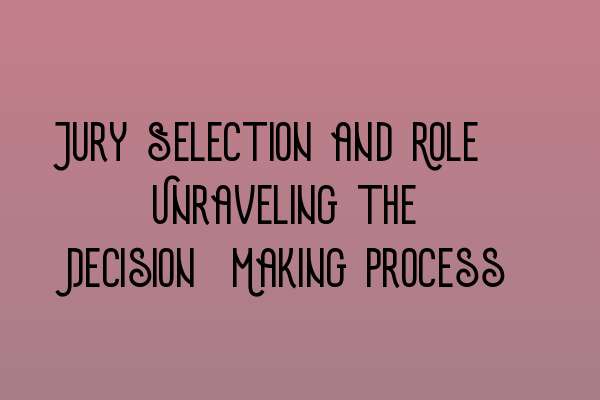Jury Selection and Role: Unraveling the Decision-Making Process
When it comes to criminal trials, one of the most crucial aspects is the selection of a fair and impartial jury. The responsibility of the jury is to evaluate the evidence presented in court and make a decision on the guilt or innocence of the accused. However, the decision-making process is not as straightforward as it may seem. In this article, we will dive deep into the intricacies of jury selection and the role they play in criminal trials.
The Jury Selection Process
The jury selection process, also known as voir dire, is a critical stage in a criminal trial. It involves the screening and selection of potential jurors from a pool of individuals summoned to the court. The purpose of this process is to ensure that the jury members are unbiased and capable of rendering a fair verdict.
During voir dire, the prosecution and the defense have the opportunity to question potential jurors to assess their suitability for the case. This includes asking questions about their background, beliefs, and any biases they may have. The goal is to identify any potential biases that could affect their ability to be impartial.
It is important to note that the process of jury selection can vary from jurisdiction to jurisdiction. Some jurisdictions use a random selection process, while others allow attorneys to remove potential jurors through peremptory challenges. These challenges can be used to exclude jurors without stating a specific reason or through challenges for cause, which are based on a specific bias or lack of qualifications.
For attorneys, the selection of jurors is a strategic process. They aim to select jurors who will be sympathetic to their client’s case or who may have biases that can be leveraged in their favor. This is where the skills of a seasoned criminal defense solicitor come into play.
The Role of the Jury
Once the jury has been selected, their role in the criminal trial begins. The jury acts as the fact-finder and must evaluate the evidence presented by both the prosecution and the defense. They must listen attentively to the testimony, examine physical evidence, and weigh the credibility of witnesses.
It is crucial for the jury to remain neutral and apply the law impartially. They must base their decision solely on the evidence presented in court and the instructions given by the judge. It is their duty to determine the credibility of witnesses, assess the strength of the evidence, and arrive at a verdict.
The decision reached by the jury must be unanimous in criminal trials, except in cases where a majority verdict is permitted. If the jury cannot reach a unanimous decision, it results in a hung jury, and the case may be retried with a new jury.
Importance of Jury Selection
The jury selection process plays a pivotal role in ensuring a fair trial. The composition of the jury can greatly influence the outcome of a case. If a juror has a demonstrated bias, it can undermine the fairness and impartiality of the trial.
Attorneys, therefore, consider jury selection as an art form. They analyze potential jurors’ responses during voir dire, their body language, and demeanor to gauge their potential biases. By selecting jurors who are inclined to be favorable to their case, attorneys can increase the chances of a favorable outcome for their client.
A skilled criminal defense solicitor understands the complexities involved in jury selection. They strive to select jurors who are fair-minded, open to alternative perspectives, and able to set aside personal biases. Their goal is to assemble a jury that will carefully consider the evidence, follow the law, and render a just verdict.
Conclusion
Jury selection is a critical component of the criminal trial process. It ensures that defendants receive a fair and impartial trial by their peers. The selection of an unbiased jury and their subsequent role in evaluating the evidence is crucial to upholding the principles of justice.
If you’re preparing for a criminal law examination, check out our related articles for valuable resources:
- SQE 1 Practice Exam Questions
- SQE 1 Practice Mocks FLK1 FLK2
- SQE 2 Preparation Courses
- SQE 1 Preparation Courses
- SRA SQE Exam Dates
By utilizing these resources, you can enhance your knowledge and maximize your chances of success in your criminal law examinations.
